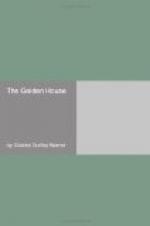“Well, this morning I have to go up to the riding-school to see a horse —Storm; I want to try him. And then I have to go down to Twist’s and see a lot of Japanese drawings he’s got over. Do you know that the birds and other animals those beggars have been drawing, which we thought were caricatures, are the real thing? They have eyes sharp enough to see things in motion—flying birds and moving horses which we never caught till we put the camera on them. Awfully curious. Then I shall step into the club a minute, and—”
“Be in at lunch? Bess is coming.”
“Don’t wait lunch. I’ve a lot to do.”
Edith followed him with her eyes, a little wistfully; she heard the outer door close, and still sat at the table, turning over the pile of notes at her plate, and thinking of many things—things that it began to dawn upon her mind could not be done, and things of immediate urgency that must be done. Life did not seem quite such a simple problem to her as it had looked a year ago. That there is nothing like experiment to clear the vision is the general idea, but oftener it is experience that perplexes. Indeed, Edith was thinking that some things seemed much easier to her before she had tried them.
As she sat at the table with a faultless morning-gown, with a bunch of English violets in her bosom, an artist could have desired no better subject. Many people thought her eyes her best feature; they were large brown eyes, yet not always brown, green at times, liquid, but never uncertain, apt to have a smile in them, yet their chief appealing characteristic was trustfulness, a pure sort of steadfastness, that always conveyed the impression of a womanly personal interest in the person upon whom they were fixed. They were eyes that haunted one like a remembered strain of music. The lips were full, and the mouth was drawn in such exquisite lines that it needed the clear-cut and emphasized chin to give firmness to its beauty. The broad forehead, with arching eyebrows, gave an intellectual cast to a face the special stamp of which was purity. The nose, with thin open nostrils, a little too strong for beauty, together with the chin, gave the impression of firmness and courage; but the wonderful eyes, the inviting mouth, so modified this that the total impression was that of high spirit and great sweetness of character. It was the sort of face from which one might expect passionate love or unflinching martyrdom. Her voice had a quality the memory of which lingered longer even than the expression of her eyes; it was low, and, as one might say, a fruity voice, not quite clear, though sweet, as if veiled in femineity. This note of royal womanhood was also in her figure, a little more than medium in height, and full of natural grace. Somehow Edith, with all these good points, had not the reputation of a belle or a beauty—perhaps for want of some artificial splendor—but one could not be long in her company without feeling that she had great charm, without which beauty becomes insipid and even commonplace, and with which the plainest woman is attractive.




